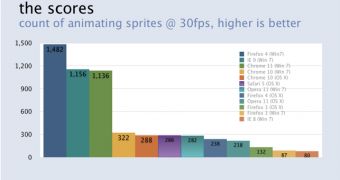While much of 2010 was dedicated to HTML5 in general, 2011 seems to be about HTML5 gaming. People love to play games and there are few better ways of showing off what the web can do than a fun and nicely put together game. But there's some way to go until HTML5 and other web technologies become a suitable alternative for most web-based games.
Luckily, there are quite a few people working on this. While HTML5 paired with JavaScript, CSS3 and a plethora of other web technologies are provide a solid platform for games, there's not much experience in the field.
Mozilla, Google and Facebook are all working to push HTML5 game development, each in their own way. Mozilla held the Game On competition and Google is touting technologies in Chrome, like WebGL and HTML5 Canvas.
Some people at Facebook are working on a benchmark that is designed equally to showcase how browsers are performing and what are the best approaches and techniques to designing a good HTML5-based game.
Last month, the first version of the benchmark was released along with some testing results. While the idea was promising, the actual numbers left a lot to be desired.
Being a very early release along with some methodology errors led to rather unreliable results. But now there's a new version out along with a new round of testing and the ranking has changed significantly.
Whereas IE9 was the king of the hill in JSGameBench 0.1, Firefox 4 leads the way now, by a significant margin, and Chrome is putting up a fight.
Of course, the same caveats apply this time around, the results can't be treated as an indication of how well browsers are performing, it's just too early to make a reliable assessment.
But things are starting to look more in line with what you'd expect, Firefox 4.0, IE9 and Chrome 11 all perform well and stay close to each other. The Facebook developers working on the benchmark are pleased with the progress so far, but there is still plenty to be done until it can be an useful tool for testing browsers.
"Today marks the release of version 0.2, a much faster and cleaner version. We continue to learn both from tightening the code and from the strong HTML5 community," Facebook's Cory Ondrejka writes.
"Thanks to help from the HTML5 community, JSGameBench has roughly doubled performance in the most widely used browsers in only two weeks. This is a very promising development for the future of HTML5 games and interactive apps," he added.

 14 DAY TRIAL //
14 DAY TRIAL //